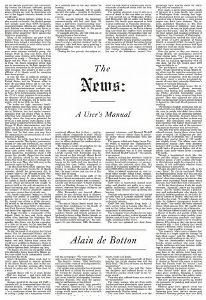Fit to Print?
Author: Alain de Botton
 No matter where you are on the political spectrum, everyone agrees that a healthy, independent press is essential in order to maintain a functioning democracy. It’s as true now as it was in 1776. But as the information industry has evolved over the centuries, one could argue that this critical ingredient is no longer serving its purpose. Whether it’s due to the growth of the multinational media conglomerates, the increasing level of apathy in the electorate or the rise of the Kardashians, the press no longer occupies its once respected niche in society. In The News: A User’s Manual, British author Alain de Botton analyzes the current crisis, attempting to help media customers (that’s everyone) use the news more effectively and providing some thoughtful suggestions for those who “create” the news that we all rely on.
No matter where you are on the political spectrum, everyone agrees that a healthy, independent press is essential in order to maintain a functioning democracy. It’s as true now as it was in 1776. But as the information industry has evolved over the centuries, one could argue that this critical ingredient is no longer serving its purpose. Whether it’s due to the growth of the multinational media conglomerates, the increasing level of apathy in the electorate or the rise of the Kardashians, the press no longer occupies its once respected niche in society. In The News: A User’s Manual, British author Alain de Botton analyzes the current crisis, attempting to help media customers (that’s everyone) use the news more effectively and providing some thoughtful suggestions for those who “create” the news that we all rely on.
De Botton starts out by exploring why humans find some kinds of news so irresistible, while other topics provoke unremitting boredom. Stories about the latest scandals, natural disasters, horrific crimes and famous people at the grocery story never seem to lack viewers, while seemingly more important topics about climate change, pollutants in the water supply and white-collar financial crime gain much less traction. He also discusses how the purveyors of news and the consumers seem to be locked in an unending cycle of decline. Frequent exposure to a “if it bleeds it leads” news philosophy feeds the baser aspects of human nature, making it less likely for viewers and readers to have the patience required for more nuanced and significant stories. This lack of consumer interest is then used as an excuse to reduce thoughtful reportage even further, until Paris Hilton, Kanye West and Miley Cyrus become the major newsmakers of the day.
Frequently invoking the fine arts as an example, de Botton goes on to make some suggestions for improvement of the modern media. Society has valued its talented storytellers and visual artists for millennia, but for various reasons artistry has been completely eliminated from the modern news presentation, in favor of such dubious ideas as “objectivity” and “balance”. The author makes a compelling argument that most “boring” stories are primarily suffering from a dull presentation style and might be much more compelling if a modern Shakespeare was allowed to provide some dramatic flair. Readers can’t be expected to care about important news topics if they’re presented with the level of enthusiasm associated with a consistent dental flossing routine.
The author was blessed with a high quality education – various expensive London-area prep schools and Caius College in Cambridge – and it shows in his wonderful writing style, all the more remarkable given that he grew up in Switzerland, speaking French and German. Unfortunately, while the book is a pleasure to read, I’m not convinced that it contains much of substance. His observations are often quite obvious and when he’s not being too simplistic or naïve in his suggestions, he drifts into an overly condescending tone. He writes so well that it’s easy to ignore these faults and read along pleasantly, but in the end still feel rather hungry.
My main complaint is that de Botton isn’t critical enough. He makes no effort to figure out who benefits from keeping the news industry in its current condition. Blaming the sorry state of modern media on the weakness of human nature and tired editors doesn’t really go deep enough. I don’t think I’m being paranoid when I say that there are larger political agendas at play here and the media is an important part of that story. While I don’t think that the hoopla surrounding the Super Bowl or Kim Kardashian’s love life is part of a large geopolitical conspiracy, the hype can be used effectively to distract people from more important topics. Unfortunately, de Botton doesn’t choose to go there, considerably decreasing the value of this effort, as superbly worded as it may be.
I suspect that one’s verdict on The News: A User’s Manual depends significantly on where one lives on the cynicism spectrum. Truly incorrigible cynics, like me, will be annoyed at de Botton’s decision to forego a critique of the media from a political or economic point of view, while more forgiving sorts will find his thoughts more enlightening. In my opinion, this defect represents a fatal flaw and the book turns out to be nothing more than a well-written self-help book for media junkies. Not recommended.
— D. Driftless
- Best Non-Fiction of 2016 - February 1, 2017
- Little Free Library Series — Savannah - May 22, 2015
- Little Free Library Series — Wyoming - November 30, 2014





Leave A Comment